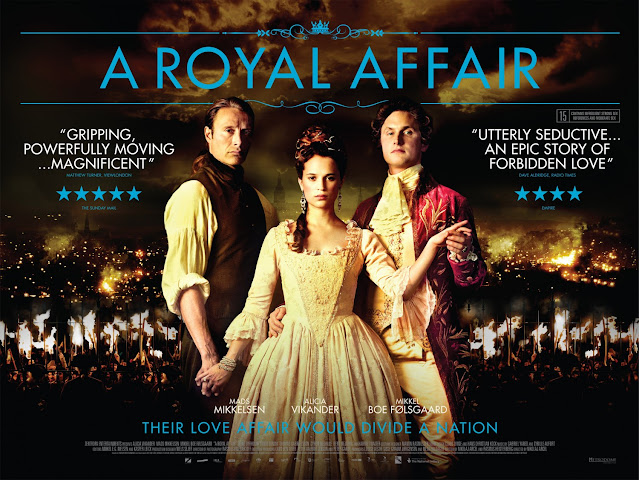Bizarre love triangle
Wednesday, May 25, 2022
Costume drama period pieces that depict a historical event can be hit-or-miss affairs, depending on the caliber of acting, production values, attention to detail and authenticity, and directorial prowess. Thankfully, A Royal Affair, directed by Nikolaj Arcel, excels in most of these areas and provides a fascinating history lesson by reenacting a true-life story that many moviegoers know nothing about: how the mentally ill King Christian VII of Denmark is persuaded by his wife Caroline and his physician Johann Struensee to reform the laws and edicts of his country for the betterment of the Danish people, and the love triangle that ensues between these three characters. The CineVerse faithful deconstructed this picture last week and offered several interesting readings and insights into the film, shared below (to listen to a recording of our group discussion, click here).
What did you find distinctive, unexpected, refreshing, or satisfying about A Royal Affair?
- The movie is well cast, with Mads Mikkelsen, Alicia Vikander, and Mikkel Felsgaard playing their parts memorably and believably.
- Many period dramas set in this era, especially stories about surreptitious romantic trysts and depicting the carnal natures of key characters, indulge in more nudity and titillating visuals designed to arouse the audience. This film shows relative restraint in its bedroom scenes without trying to exploit actress Alicia Vikander.
- King Christian initially presents himself as a buffoonish, impish, and selfish pursuer of base pleasures and upholding little dignity or grace, despite his status. But he becomes a more sympathetic personality as the movie progresses. We see how little power he truly possesses and how he has been set up as a figurehead who is patronized and tolerated by the court and his stepmother. As we are more exposed to his mental illness, it’s easier to feel empathetic toward Christian, who is supposedly only 17 years old.
- This is based on true characters and events, with less dramatic license taken than in many other historical cinematic dramatizations. If you didn’t know anything about the real Christian VII of Denmark and his queen and physician, you might assume that the filmmakers greatly exaggerated this story, its love triangle, and the reforms made by Christian and his children. But research supports this narrative as being predominantly accurate and authentic: There actually was a royal scandal involving these three, the dates given are mostly correct, and the majority of the events portrayed are grounded in fact.
- This story is all the more intriguing and amazing because it hasn’t been dramatized before in a major motion picture, unlike the many iterations of, say, Marie Antoinette or Queen Elizabeth.
Major themes
- The constant struggle for enlightenment, wisdom, and reason against the forces of oppression, ignorance, and selfishness. The doctor and the queen value knowledge, progressive thinking, and science and try to use their influence on the king to amend the laws and practices that will better the people of Denmark. But they are continually thwarted by the court, which favors maintaining the status quo, embraces religious rules, and resists critical thinking and the age of Enlightenment.
- This is a theme that has significance today, as the world continues to see conflict between those who put stock in science, rational thought, and progressive advancements and those who hold fast to old beliefs and values that would set back the pace of progress.
- Bluray.com reviewer Casey Broadwater wrote: “Politically minded viewers will notice parallels to several current arguments—from healthcare reform and women's rights to class warfare and the separation of church and state—and the film leaves the nagging impression that perhaps we haven't come as far since the Enlightenment as some of us would like to think.”
- The pleasures and perils of forbidden love. Caroline is in a loveless arranged royal marriage in which she essentially has no power and receives and gives no affection to the king. She finds love and affectionate intimacy with Johann, the king’s doctor.
- A complicated love triangle. The private lives and fates of King Christian, Caroline, and Johann are intertwined.
- Serving a greater good. Caroline and Johann collaborate to influence the king to make changes for the good of their subjects, including persuading the king to prevent the court from making rules and laws. In doing so, they risk political turmoil, personal safety, and criticism from the Danish people.
- Wearing and hiding behind masks versus revealing your true identity/nature.
Similar works
- Queen Margot
- Farewell My Queen
- Amadeus
- Dangerous Liaisons
- Marie Antoinette
- The Favourite
- The Great
- The Other Boleyn Girl
- The Duchess
- The Tudors
- Anna Karenina
- A Tale of Two Cities
- The Madness of King George
- The King’s Speech




